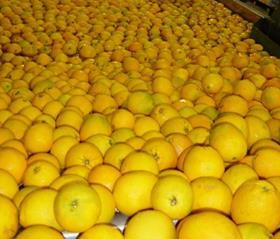
The shipment of citrus containers from South Africa to the US has been abandoned following problems on arrival in Philadelphia which has resulted in huge losses for exporters.
Shipping line Maersk has suspended the transport of South African citrus fruit in containers to the US until further notice. The step has been taken after a number of containers failed clearance on arrival in Philadelphia, due to what Maersk has called different 'interpretations of the cold treatment protocols.
The move has resulted in a major row over the ability of containers to comply with the rigid requirements of the tough sterri programme to the US leading to tension between exporters, shipping lines and the authorities in Philadelphia.
“If clarity is not forthcoming, this ban will also affect our table grape shipments for the up-coming season,” said a Maersk statement.
“There have been problems with some containers arriving at Philadelphia on the last container vessel, Ngami,” said Gerrit van der Merwe, chairman of the Western Cape Citrus Producers’ Forum (WCCPF), who is presently in Philadelphia. “The US authorities have severely penalised containers which had temperature spikes and in a number of cases a great deal of extra time was added to the sterri process. There are nine containers where the entire process had been aborted as the United States Department of Agriculture (USDA) and others felt that the containers have no hope of ever completing the sterri process. These containers will be transhipped to Canada.
“The USDA told us to read between the lines,” said one exporter currently in the United States. “Containers do not work. In South Africa, container liners are pro actively marketing this service. I am to be convinced that those benefitting from it here (in the US) share their absolute concern for our fruit.
In the past, South African citrus has been shipped mostly in traditional reefer vessels where it proved to be much easier to manage the sterri process.
According to Maersk the company will, with immediate effect, take no further Citrus Cold Treatment bookings from South Africa for the US East Coast, Newark or Philadelphia.
“This ban is dependant upon clarity being received from the National Department of Agriculture (South Africa) regarding the interpretation of the T107-k protocol by the USDA,' the group continued. 'Currently we are seeing unacceptable discrepancies in how the protocol is being interpreted by the USDA, resulting in huge unrealistic amounts of extra time being added to the protocol. If clarity is not forth-coming this ban will also affect our Table Grapes T107-e shipments for the up-coming season.”
The company says that bookings for deciduous fruit according to T107-a may still be accepted.
Taking a philosophical view on the problem, chief executive of the WCCPF Piet Smit said that growers are in their first year of using fairly large volumes of containers to the US.
“With anything new there are always growing pains,” said Mr Smit. “I believe it is not so much the interpretation of the protocol, but rather the problems with containers themselves, as well as the management issues at Packer Avenue in Philadelphia where the containers are discharged.”
Mr Smit explained that it is important to resolve these problems, because in the long term containers will form a very important part of the logistics operation in supplying the US programme.
Growers point out that it is difficult enough to comply with phytosanitary requirements without further delays being added. “Keeping citrus fruit under the sterri conditions for the required 24 days is tough on the fruit and to then learn that another 5 days to 33 days have been added (as happened here) makes our lives a misery,” said one grower.
Meanwhile, growers will have to count the cost of containers which have been standing on the quay at Packer Avenue in Philadelphia for about ten days at US$400 per day, as well as the fact that they will lose the higher market values of the products in the US and may have to contend with quality problems once the fruit arrives in Canada.
Growers are hoping that marine cargo insurance policy includes delay clauses so they do not end up having to fight a protracted court battle with shipping companies, as was the case with last year’s disaster when two decks of a reefer vessel failed to stabilize and fruit was rejected on arrival in the US.






No comments yet